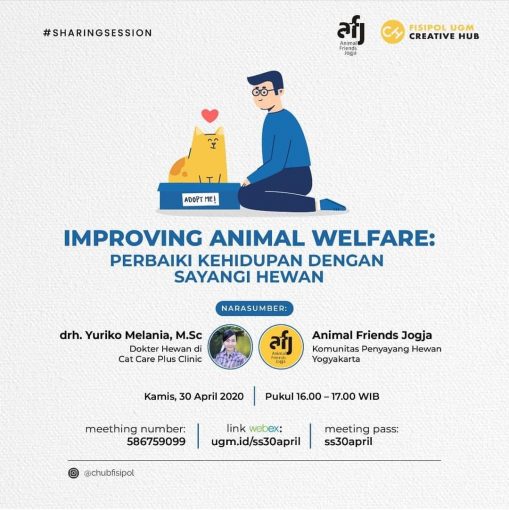
Yogyakarta, April 30th, 2020—Fisipol Creative Hub (C-Hub) held a sharing session with the theme “Improving Animal Welfare: Improve Life with love for Animals”. By inviting to expert speakers in the animal field, the online discussion series was held on (4/30) via an online platform. The two speakers included drh. Yuriko Melania, M.Sc who is a veterinarian practitioner at the Cat Care Plus Clinic and the second speaker drh. Andre, who also has a background as veterinarians invited as well as representing the animal lover community Animal Friends Jogja (AFJ).
The discussion began with an explanation by drh. Andre, as a representative of Animal Friends Jogja. As a contributor to the medical field in the community, drh. Andre explained a lot about the basics of caring for dogs and cats as assisted animals generally owned by the people. “In accompanying pets during the plague, it uses the same principle as the daily caring, but it must be considered with extra hygiene and health conditions both animals and their owners,” said drh. Andre.
Along with Animal Friends Jogja, drh. Andre also advocates various issues related to animal welfare which concerned together with the community. “Lots of campaigns related to animals are carried out, not just pets,” he mentioned. Campaigns such as Go Cage-Free, Indonesian Dog Meat-Free, and many other campaigns are some of the issues advocated by Animal Friends Jogja.
The second session was delivered by drh. Yuriko or often called as drh. Mela. Having more than nine years as a veterinarian, drh. Mela shared various interesting discussion about animals, viruses and conditions in the current pandemic. “Efforts to prevent and minimize the risk of zoonosis (an infectious disease caused by pathogen from animal to a human) can be pursued through three main ways, namely by maintaining the animals health through vaccination or antiparasitic, the second is to maintain the hygiene of animals and owners by washing hands, eating properly cooked food and finally by caring for beloved animals in-home,” explained drh. Mela. She also explained the scheme of toxoplasmosis (the disease from the infection of toxoplasma gondii parasite) transmission and spread in animal chains to be able to transmit humans. “Not directly, but through various media, such as polluted plants, or animal meat consumed by humans and contaminated with toxoplasmosis,” she said.
